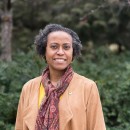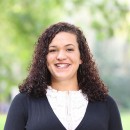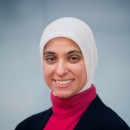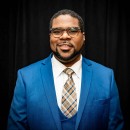Public Engagement News
Pages
 Trina Shanks Quoted in CNN on the Legacy of Racial Violence
Trina Shanks Quoted in CNN on the Legacy of Racial ViolenceProfessor Trina Shanks discusses with CNN the lasting impact of racial violence from the end of the Civil War through the early 20th century. The Tulsa race massacre, which took place 100 years ago this week, was one of the worst acts of racial violence in American history, and part of a larger pattern of assault. “If Blacks were successful and actually were visibly prosperous, that made them a target. Some of the violence might have been triggered by this economic envy,” said Shanks. She explains that some White Americans thought, “How can we make sure that we reserve these economic benefits and opportunities for the White population and our children and push Blacks out so there can be more for us.”
- June 1, 2021
- Learn more »
 Rogério M. Pinto Speaks with Fox 17 on How Protests Affect Public Opinion
Rogério M. Pinto Speaks with Fox 17 on How Protests Affect Public OpinionProfessor Rogério M. Pinto spoke with Fox 17 West Michigan about how demonstrations can change public opinion. In the wake of George Floyd’s death last year, there were over 10,000 protests and demonstration events over the summer, 95% of them were peaceful. “Protests are also effective in the sense of changing people’s hearts, not just their opinions but changing how they feel about groups in the population,” said Pinto.
- June 1, 2021
- Learn more »
 Trina Shanks on Creating Change Through Public Engagement
Trina Shanks on Creating Change Through Public EngagementProfessor Trina Shanks discusses how public engagement connects U-M, Detroit and local communities. Shanks research focuses on creating solutions, including childhood saving accounts and neighborhood investment programs. After initially researching the “why” in racial income disparity, Shanks learned “I’d really prefer to be part of the conversation about concrete changes that can make a difference in helping people to thrive and improve life chances for all people, particularly those facing economic hardship.”
- June 1, 2021
- Learn more »
- PhD Student and Reverend Charles Williams Discusses the COVID-19 Vaccine Race Gap with the HuffPost
PhD student and Reverend Charles Williams of Detroit’s King Solomon Baptist Church is featured in a HuffPost article about closing the COVID-19 vaccine race gap. Citing accessibility and hesitancy, Williams thinks it could be a year or more before citywide vaccination rates in Detroit catch up to the rest of the country. “There’s a sincere concern about the care that many of us get when we go to the doctor’s office, end up in the hospital,” Williams said. “You talk to any Black family, we all have the same strategy ― somebody is going to have to be there around the clock, in the room, to stay on top of these nurses and to make sure the doctor comes by, because if we don’t practice that strategy, the system will let our loved one down.”
- May 27, 2021
- Learn more »


 Making an Impact: SSW Research Contributes to Ban on Corporal Punishment in Colombia
Making an Impact: SSW Research Contributes to Ban on Corporal Punishment in ColombiaPhD student Garrett Pace, Associate Professor Shawna Lee, and Professor Andrew Grogan-Kaylor's research was cited in public policy discussions in Colombia, leading to a ban on corporal punishment of children in that country. Colombian legislator Julián Peinado Ramírez shared his memo on Twitter, which references Grogan-Kaylor, Lee and Pace’s 2019 work. The research and ban were also featured on Radio Santa Fe 1070 AM Bogotá.
- March 26, 2021
- Learn more »
 Aysha Ghazi Edwin on Asian American/Pacific Islander Women’s Equal Pay in Detroit News
Aysha Ghazi Edwin on Asian American/Pacific Islander Women’s Equal Pay in Detroit NewsLecturer Ayesha Ghazi Edwin’s letter to the editor “Race and ethnicity shouldn’t determine women’s pay” was published in the Detroit News. Edwin discusses Asian American/Pacific Islander women’s Equal Pay Day writing “If we are to close the pay gap, we need to strengthen equal pay laws to allow women to discover and fight against pay discrimination.”
- March 18, 2021
- Learn more »
 Joe Ryan to Lead Data Subcommittee of New Task Force to Address Racism in the Michigan’s Child Protection System
Joe Ryan to Lead Data Subcommittee of New Task Force to Address Racism in the Michigan’s Child Protection SystemJoe Ryan is a member of a new task force created by the Michigan Department of Health and Human Services (MDHHS) charged with preventing and eliminating systemic racism in the state's child protection system. He will chair the data subcommittee.
- March 9, 2021
- Learn more »

 Karen Staller, Briana Starks and Håvard Aaslund Co-edit Recent Special Double Issue of Qualitative Social Work: Research and Practice
Karen Staller, Briana Starks and Håvard Aaslund Co-edit Recent Special Double Issue of Qualitative Social Work: Research and PracticeAssociate Professor Karen Staller, Joint PhD Social Work and Sociology Student Briana Starks and Visiting Scholar Håvard Aaslund co-edited the recent special double issue of Qualitative Social Work: Research and Practice, “Reflections on a Pandemic: Disruptions, Distractions, and Discoveries.” The double issue contains 86 reflexive essays submitted by authors from 35 different countries (and every continent except Antarctica). Taken together, the essays paint a portrait of the breadth and depth of social work during the earliest months of the historic pandemic from every corner of the globe. Other U-M contributors to the issue include Assistant Professor Odessa Gonzalez Benson, and current doctoral students in Joint PhD Social Work and Sociology Finn Bell and Angela Perone.
- March 8, 2021
- Learn more »
 ENGAGE Program Manager Fatima Salman, MSW ‘15, named Racial Equity Fellow
ENGAGE Program Manager Fatima Salman, MSW ‘15, named Racial Equity FellowENGAGE Program Manager Fatima Salman, MSW ‘15, is one of five alumni named as Racial Equity Fellows by Detroit Equity Action Lab. The Racial Equity Fellowship develops leaders who work to end structural racism in Detroit. Other alumni fellows include Michelle Anderson, MSW ‘01, Margo Dalal, MSW ‘18, Sibohan O’Laoire, MSW ‘13, and Robert Siporin, MSW ‘14.
- February 15, 2021
- Learn more »
 Charles Williams Appointed Chair of the Bipartisan Protect Michigan Commission African American Workgroup
Charles Williams Appointed Chair of the Bipartisan Protect Michigan Commission African American WorkgroupPhD student Charles Williams has been appointed chair of the Bipartisan Protect Michigan Commission African American workgroup by Governor Gretchen Whitmer. Housed within the Department of Health and Human Services, the commission will help raise awareness of the safety and effectiveness of an approved COVID-19 vaccine, educate the people of the state, and help protect the health and safety of all Michigan residents.
- January 29, 2021
- Learn more »